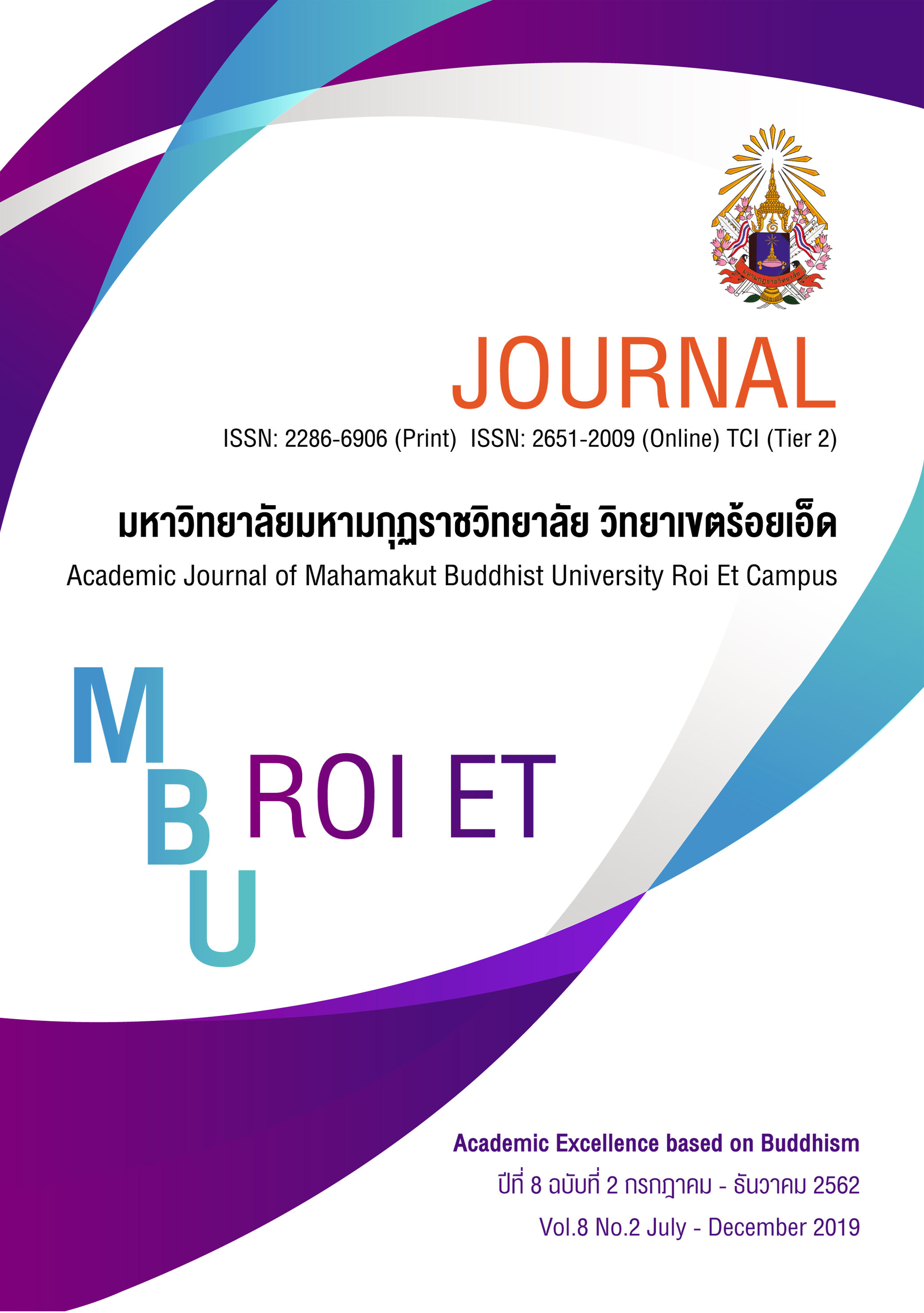San Don Ta : A Study of Community Beliefs on the Ritual Khukhan District Sisaket Province
Main Article Content
Abstract
The purpose of this article : 1. To learn the ways of the Buddhist temples that appear in the ceremonies. “San Don ta”. 2. To learn the factor of society that there is a relationship to the ceremonies. "San Don ta" Khukhan District Sisaket Province. 3. To offer the belief of the community with the ceremonies. "San Don ta" Khukhan District Sisaket Province. The population and sample groups used in the research totaled 22 people, consisting of (1) Government groups are government agencies that are involved. And supporting the Sanodta tradition. (2) Villagers are representatives of the people. (3) Local leaders are those who play an important role in being leaders about rituals, Sandonta traditions and (4) Members within the family Research tools Consisting of interview forms And small group meetings etc.
The results from the research found that the motto of Buddhist temples. The villagers will have a key 1) believe the merit such as to eat the commandments of the meditation. 2) the motto of the altar such as the offering made by object and compliance but the offerings according to the principles of the ancient is displayed. 3) believe their gratitude is to her father and mother. The teacher accept sermons and reward benefactor with necessities. 4) believed to subsidies is a share of the people in the family and the community. The Ceremonies. "San Don ta" from the belief of the people in the ancient who believe the subject of the Divine Power. So the belief of the community with the ceremonies. “San Don ta” Khukhan District Sisaket Province it is a belief that is embedded in the consciousness of the people and the Khmer influences. The life is a tradition that create a sense of harmony in the social is encouraged to know the mercy and overly each other with.
Article Details
References
จารุวรรณ ธรรมวัตร. (2538). วิเคราะห์ภูมิปัญญาอีสาน. มหาสารคาม : มหาวิทยาลัยมหาสารคาม.
จำนงค์ ทองประเสริฐ. (2540). บ่อเกิดลัทธิประเพณีอินเดีย เล่ม 1. พิมพ์ครั้งที่ 2. กรุงเทพมหานคร : ราชบัณฑิตยสถาน.
บรรพต เปรมชู. (2522). พิธีโฎนตา. บุรีรัมย์ : วิทยาลัยครูบุรีรัมย์.
เบญจรัตน์ เมืองไทย. (2543). พิธีทรงเจ้า : พิธีกรรมกับโครงสร้างสังคมที่บ้านหนองขาว. วิทยานิพนธ์ศิลปศาสตรมหาบัณฑิต. บัณฑิตวิทยาลัย : มหาวิทยาลัยศิลปากร.
ประสาธน์ ศรีจักร (ปราชญ์ชาวบ้าน) ผู้ให้สัมภาษณ์. วันที่ 29 มีนาคม 2561. ณ บ้านเลขที่ 198 หมู่ที่ 14 ตำบลห้วยเหนือ อำเภอขุขันธ์ จังหวัดศรีสะเกษ.
พระมหาสุขสัญญา กตปุญโญ (เจ้าอาวาสวัดสโรงตาเจ็น) ผู้ให้สัมภาษณ์. วันที่ 29 มีนาคม 2561. ณ บ้านเลขที่ 83 หมู่ที่ 7 ตำบลโคกเพชร อำเภอขุขันธ์ จังหวัดศรีสะเกษ.
เพชราภรณ์ โสลาภา. (2537). พิธีกรรมแซนโดนตาที่บ้านกระหาด ตำบลกระหาด อำเภอจอมพระจังหวัดสุรินทร์. วิทยานิพนธ์ศิลปศาสตรมหาบัณฑิต. บัณฑิตวิทยาลัย : มหาวิทยาลัยศรีนครินทรวิโรฒ.
มณี พยอมยงค์. (2529). วัฒนธรรมล้านนาไทย. กรุงเทพมหานคร : ไทยวัฒนาพานิช.
สำลี รักสุทธี. (2549). ฮีตสิบสองคลองสิบสี่. กรุงเทพมหานคร : พัฒนาศึกษา จำกัด.
สุรชัย รัตนพนาวงษ์. (2549). การศึกษาคำศัพท์ภาษาเขมรสุรินทร์ในประเพณีแซนโฎนตา. วิทยานิพนธ์ศิลปศาสตรมหาบัณฑิต. บัณฑิตวิยาลัย : มหาวิทยาลัยศิลปากร.
สุริยนต์ น้อยสงวน (ปราชญ์ชาวบ้าน) ผู้ให้สัมภาษณ์. วันที่ 7 มิถุนายน 2561. ณ บ้านเลขที่ 96/1 ตำบลห้วยเหนือ อำเภอขุขันธ์ จังหวัดศรีสะเกษ.
สุวรรณ สุวรรณวโช. (2546). พื้นฐานความเชื่อของสังคมไทย. กรุงเทพมหานคร : บรรณกิจ.
อมรา พงศาพิชญ์. (2537). การวิจัยเชิงคุณภาพเพื่อพัฒนางาน. ขอนแก่น : สถาบันวิจัยและพัฒนา มหาวิทยาลัยขอนแก่น.


